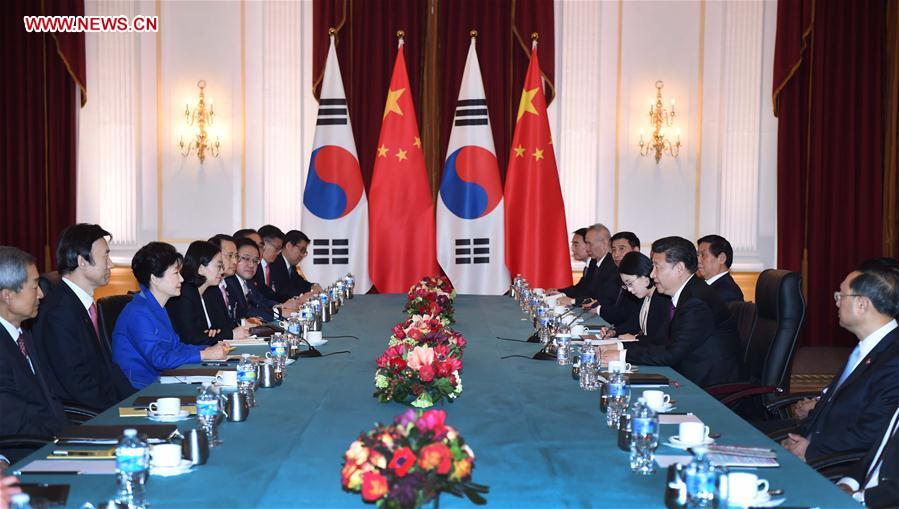


Chinese President Xi Jinping (2nd R) meets with his Republic of Korea (ROK) counterpart Park Geun-hye (3rd L) on the sidelines of the fourth Nuclear Security Summit in Washington D.C., the United States, March 31, 2016. (Xinhua/Zhang Duo)
WASHINGTON, March 31 -- Chinese President Xi Jinping on Thursday met South Korean President Park Geun-hye on the sidelines of the fourth Nuclear Security Summit (NSS), exchanging views on bilateral relationship as well as the situation on the Korean Peninsula.
Hailing the development of the bilateral ties over the past 24 years since the establishment of diplomatic relations, Xi said China attaches great importance to the relationship with South Korea and always makes it a priority in China's neighborhood diplomacy.
"It is our shared historic mission to maintain, consolidate and develop the China-S.Korea relations," Xi said, adding that China stands ready to strengthen cooperation with South Korea in various areas and set the bilateral relations onto a more stable and healthy track.
Xi said China and South Korea should maintain the momentum of high-level interactions, make use of the existing mechanisms of strategic communication, accommodate each other's major concerns, and respect each other's sovereignty, security and development interests.
Welcoming South Korea's participation into the Belt and Road initiative, Xi proposed the two sides speed up the alignment of their development strategies, focus on the implementation of the bilateral free trade agreement, and boost financial cooperation as well as cooperation on industrial park construction to advance economic integration in East Asia.
Xi also called for more people-to-people exchanges and closer bilateral coordination in international mechanisms.
Echoing Xi on his remarks about the bilateral ties, Park said the frequent interactions between the two presidents are a symbol indicating the significance of the S.Korea-China relationship.
Park agreed with Xi on enhancing strategic communication, economic cooperation, alignment of development strategies and people-to-people exchanges. She said South Korea attaches great importance to the ties with China and will advance the S. Korea-China strategic partnership of cooperation in a sustained manner.
Although the Korean Peninsula nuclear issue is not on the NSS agenda, the recent flare-up of tensions in Northeast Asia in the wake of the nuclear test and satellite launch by the Democratic People's Republic of Korea (DPRK) has caused widespread concern.
During the meeting prior to the NSS, Xi told Park that China is adamant on the efforts to achieve denuclearization of the Korean Peninsula, safeguard peace and stability on the peninsula, and solve relevant issues through dialogue and consultations.
China, he added, maintains that all parties concerned should fully and strictly carry out relevant UN resolutions. The UN Security Council adopted a resolution last month to curb the DPRK's nuclear and missile program following its nuclear test in January and satellite launch in February.
In his meeting with Park, Xi also stressed that dialogue and consultations represent the only right way to settle the predicament on the peninsula, and reaffirmed that Beijing stands ready to make constructive efforts for resuming dialogue within the framework of the six-party talks. The six-party talks, which involve South Korea, the DPRK, China, the United States, Russia and Japan, have been stalled since late 2008.
Park said that her country is willing to maintain close communication with China on relevant issues.
During the Xi-Park meeting, the two leaders also decided to unveil a list of programs for cultural exchanges in 2016. It includes a total of 69 programs in such areas as education, culture and youth exchanges.
China and South Korea established a joint committee for cultural exchanges, after Park visited China in 2013.
Day|Week

 Kenyan woman's crappy photoshopped pictures make her a web celebrity
Kenyan woman's crappy photoshopped pictures make her a web celebrity Magnificent view of E. China's Anhui province
Magnificent view of E. China's Anhui province Global landmarks captured in striking shots
Global landmarks captured in striking shots Thailand Elephants Disguised as Pandas Sparks Debates
Thailand Elephants Disguised as Pandas Sparks Debates College girl dresses as mermaid to mark World Water Day
College girl dresses as mermaid to mark World Water Day J-15 fighters in drill on Chinese aircraft carrier
J-15 fighters in drill on Chinese aircraft carrier 96-Year-Old Veteran Becomes Fashion Icon
96-Year-Old Veteran Becomes Fashion Icon Creative mother produces 232 unique breakfasts
Creative mother produces 232 unique breakfasts Charming folk customs in Kalajun Grassland
Charming folk customs in Kalajun Grassland A glimpse of ships and boats commissioned to PLA Navy in past 3 years
A glimpse of ships and boats commissioned to PLA Navy in past 3 years